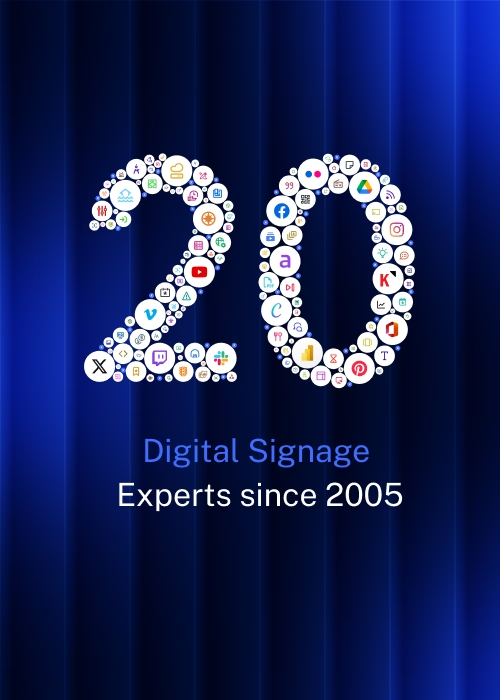Everything You Need to Know About Facebook’s Rebranding
Facebook is an American company providing online social networking services. Mark Zuckerberg, Dustin Moskovitz, Eduardo Saverin, and Christ Hughes, students at Harvard University, established the Facebook brand in 2004.
As the company has gained success, becoming the largest social network worldwide with over a billion users as of 2012, the company has also received criticism and backlash. In result, a major company revamp was announced introducing Meta. Here is a brief history of Facebook, its changes over time, and how its current brand may affect digital signage.

What Was Facebook’s Original Goal?
Facebook’s original goal was to enable Harvard students to use their email addresses and photos to communicate with other students at the school. Later on, Mark Zuckerberg decided to extend the social experience of college to the internet. He aimed to create a place that would help students connect with each other.
Why Did Zuckerberg Make Facebook?
In January 2004, Mark Zuckerberg wrote the code for a new site called FaceMash. The site compared the faces of Harvard students and asked users to compare them for attractiveness. Within 4 hours, the site had attracted 22,000 views.
However, the site went against Harvard's policies. The site hacked into the school's security system and copied the student ID photos required for the site. Harvard's administration shut down the site within days.
Above all, Zuckerberg’s experience with FaceMash gave him the idea of creating a social networking site. This site would allow students at Harvard to use their email addresses and photos to communicate with each other. The site was named Facebook and started operations the same year.
Within 24 hours, up to 1,200 students had signed up to Facebook. In a month, half of the Harvard undergraduates had Facebook profiles. The site spread to Columbia, Yale, and Stanford college campuses.
It soon spread to three other college campuses in the U.S. — Yale, Columbia, and Stanford. In 2005, high schools in the U.S. could sign up, and then it finally began spreading worldwide.
Facebook Controversies before Rebrand
Facebook has had its fair share of controversies. Actually, one popular story is that Facebook disseminates fake news. This came to the limelight during the 2016 U.S. presidential elections. Facebook faced allegations of permitting the creation of fake Russian Facebook accounts. Additionally, these accounts facilitated the purchase of ads that spread propaganda intending to influence the outcome of the elections.
Many believe that these ads influenced the election results. These accusations continue to tarnish the reputation of the company. Also, Facebook has faced allegations of allowing dangerous propaganda and fake news on its site. Recently, Zuckerberg was accused of making no effort to address the hate speech on the site.
In fact, it was alleged that the Facebook founder was encouraging the spread of hate speech through its policies. In June 2020, Facebook disowned advertisers who refused to have their ads appear next to content from hate speech groups.
Facebook woes didn't end with the data harvesting scandal. In the same year, the company was hacked. The hack affected more than 50 million users. This was the largest hack Facebook had experienced at the time. Further, the hackers gained access to sensitive account information.
Milestones by Facebook

Facebook has come from a socializing site for college students to a renowned international social media company. The major milestones by Facebook include its IPO in May 2012 that raised $16 billion. As a result, the company obtained a market value of $102.4 billion. The following year, Facebook acquired Atlas, Instagram. Later in 2014, the company acquired WhatsApp and launched a Groups App.
Facebook continued to expand its internet market share by launching Facebook Marketplace. This upgrade allows its users to buy and sell products. In 2018, Facebook launched a hands-free video calling portal. The following year, it launched a Tinder-like dating application that supports Instagram. Later on, the company announces its AI tool that converts 2D images into 3D images. In the same year, it also launched its “dark mode” feature for mobile users.
Recent Facebook Developments
One of the notable developments by Facebook is its recent launch of Reels. Instagram Reels has become popular for higher engagement rates compared to other formats on the platform. What's more, Reels has come to Facebook and is available on Android and iOS in the U.S. The full-screen vertical videos enable you to create an in-app that incorporates audio clips. Also, you can respond to the content by commenting, sharing, or liking.
Another recent Facebook update is the ability to connect with your WhatsApp customers through Instagram. This is possible if you add a WhatsApp CTA button on your Instagram profile. When you click on the app, users can talk to you there directly.
Furthermore, you can link your Instagram and business WhatsApp accounts. You can achieve this by inputting your WhatsApp number in your Instagram account. This allows users who prefer to communicate through WhatsApp to do so through Instagram.
Facebook Rebrands to Metaverse
The most recent announcement by Mark Zuckerberg is that Facebook has a new corporate name. The company’s new name is Meta, the Greek word for beyond. The name change is a marketing strategy used to help a company recover from negative publicity. Supporting the rebrand, Zuckerberg says he chooses the name not only for its meaning, but also because it alludes to "Metaverse," a virtual reality platform he plans to create.
In fact, the new company brand was announced on Thursday. Critics argue that Facebook is attempting to distance itself from its social-media business crisis. The tech giant has come under a lot of scrutiny, especially after whistleblowers presented damning Facebook Papers to Congress and the U.S. Securities and Exchange Commission.
On the other hand, Mark Zuckerberg claims his broader ambitions are to focus on a virtual universe. His technology will enable users to put on VR headsets and move freely like avatars, go to business meetings, and socialize at get-togethers. It will also allow users to shop in virtual stores. Zuckerberg further noted in a blog post that he would ensure the privacy and safety of his virtual environment brand.
However, critics compare Zuckerberg's move to a crisis strategy used by Phillip Morris. The tobacco company that changed its name to Altria. This came in the wake of allegations that Philip Morris knew cigarettes are harmful to human health.
The Implications of Facebook’s Rebrand on Digital Signage

The improvements regarding Reels on Instagram and WhatsApp are set to increase the number of businesses that rely on these content apps for digital signage. Since Reels involves vertical videos, users can respond to business posts by commenting, liking, and sharing.
On the other hand, businesses using digital signage on Instagram can now conveniently reach out to potential WhatsApp users. This is possible by incorporating a WhatsApp CTA button on their Instagram accounts.
Moreover, one of the notable impacts of Facebook’s new name, “MVRS,” is that introducing a new name that acts as a parent company above ground like Oculus, and its other brands can help ease the negative publicity to each of its businesses. Actually, many businesses prefer using digital signage on a social network with a clean brand name. Google also rebranded to Alphabet, and that has only increased its popularity.
In Conclusion
Facebook started out as the ambition of college students interested in having fun and has now turned into a multi-billion-dollar brand. Like all international brands, Facebook has had its fair share of controversies. Some controversies have painted a poor image of the famous social media platform.
However, it's undeniable that Facebook has dominated the social media world with its acquisition of Instagram, Oculus, WhatsApp, and innovations such as Metaverse. The business world waits with bated breath to see how Metaverse will revolutionize digital technology, with a focus on digital signage.







